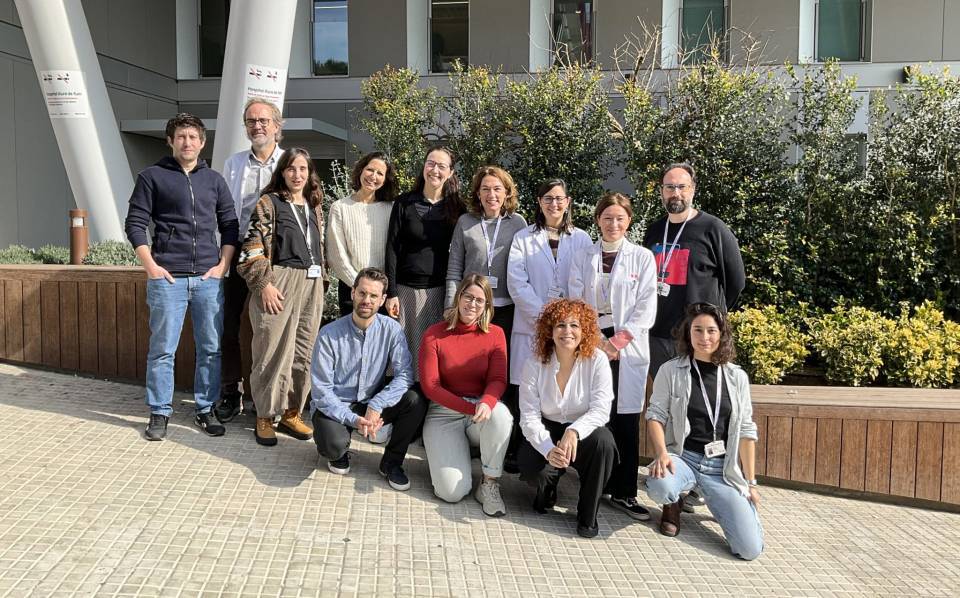TCF20 is a protein that acts as a transcription factor, regulating the expression of other genes. Until now, mutations in the gene that codes for TCF20 were associated with autistic-spectrum disorders, intellectual disability or delayed neurological development. “Nevertheless, there is evidence that TCF20 not only plays a role in neurologic processes but also controls genes associated with the extracellular matrix”, explains Manuel Morales-Ruiz, head of the IDIBAPS group Translational research on new therapeutic and diagnostic strategies in liver disease. “Collagen and other molecules that make up the matrix, surround, sustain, and give rigidity to the body’s cells and tissues. Hence, changes to TCF20 affect the expression of collagen and contribute to hepatic fibrosis”.
In order to corroborate this hypothesis, Morales-Ruiz and his team modified the genome of mice to eliminate the gene that codes for TCF20. According to the results, which were published in the journal Liver International, in the absence of the transcription factor, the rodents revealed abnormal behavior, which confirms the link between TCF20 and the characteristic behavior of autism. Furthermore, the animals presented changes in regulation of their metabolism. Specifically, mitochondrial function. “The mitochondria are the organelles of the cells responsible for producing energy and TCF20 deficiency, as well as altering their shape and distribution, also increases their oxygen consumption and, therefore, energy production, contributing to increased cellular oxidative stress”, explains the researcher.

The effects of TCF20 deficiency were also notable in the livers of the mice. In this tissue, the researchers observed an increase in fibrosis; that is, an excess of collagen and other proteins that accumulate and have a negative effect on live function. “This finding led us to wonder whether remodeling of the extracellular matrix, and the resulting fibrosis, also took place in people with genetic variants of TCF20”, said Morales-Ruiz. “For this reason, in three volunteers with mutations on TCF20, we analyzed levels of molecules that are indicators of liver damage and function, fibrosis and mitochondrial metabolism and are present in the blood. The results confirmed the role of the transcription factor as a mediator of fibrosis”.
For the researchers, the study revealed previously unknown functions of TCF20, beyond its involvement in neurologic disorders. Furthermore, they recommend routine testing for markers of hepatic fibrosis in people who carry variants of TCF20, in order to detect it even before the first symptoms appear. Finally, they hope that these findings will contribute to raising awareness about this rare condition and improve follow-up of these patients, whose health care is limited due to the scarce understanding of the function of TCF20.
The study included the participation of researchers from the Network Biomedical Research Center on Hepatic and Digestive Diseases (CIBERehd), the Network Biomedical Research Center on Rare Diseases (CIBERer), the Network Biomedical Research Center on Mental Health (CIBERsam), the Center for Animal Biotechnology and Gene Therapy (UAT-CBATEG), the CIC bioGUNE, the Prince Felipe Research Center, the Science Research Council (CSIC), Hospital 12 de Octubre, Hospital Universitario de Móstoles, and Universitat de Barcelona. The study also received funding from the Spanish Ministry of Science and Innovation the Agency for the Management of University and Research Grants (AGAUR), CIBERehd, and the Carlos III Institute of Health.
Reference article
Córdoba-Jover B, Ribera J, Portolés I, Lecue E, Rodriguez-Vita J, Pérez-Sisqués L, Mannara F, Solsona-Vilarrasa E, García-Ruiz C, Fernández-Checa JC, Casals G, Rodríguez-Revenga L, Álvarez-Mora MI, Arteche-López A, Díaz de Bustamante A, Calvo R, Pujol A, Azkargorta M, Elortza F, Malagelada C, Pinyol R, Huguet-Pradell J, Melgar-Lesmes P, Jiménez W, Morales-Ruiz M. Tcf20 deficiency is associated with increased liver fibrogenesis and alterations in mitochondrial metabolism in mice and humans. Liver Int. 2023 Jun 14. doi: 10.1111/liv.15640. Epub ahead of print.




